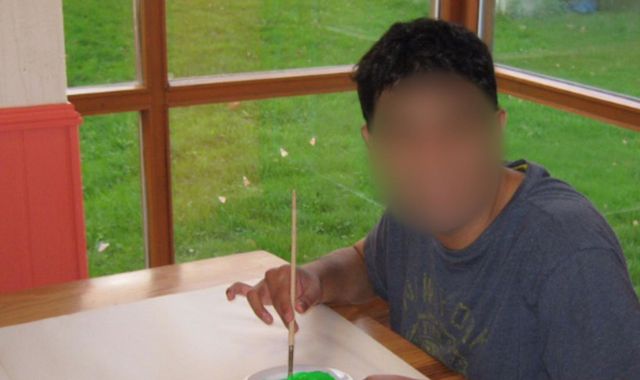Autistic man’s ‘cry for help’ living in blood and faeces-stained flat
Written by News on 14/11/2019
The blood and faeces-splattered walls, the sink ripped from its wall fixings and the broken bed in the otherwise empty room were all “a cry for help”.


Sagar has autism. His move from residential care to independent living in a flat left him so distressed he would chew through live electric cables and soil his mattress.
His sister Ridhi told Sky News: “Every night I would be scared that the next morning I’d call them and they’d say he has died.
“Because he had become so distressed, chewing live fridge wires to breaking heavy objects or shattering glass with no awareness or danger. That was the anxiety me and my family had every night, not knowing what’s going to happen the next day.
“Has he hurt himself? Is he alive? Knowing they are not increasing support… no emergency support. It was the worst point in our lives that we will ever face.”
Sagar was moved into residential care when he was 16 years old but when he was 27 his local authority – Hillingdon in west London – wanted to bring him closer to where his family lived, so he was moved into a flat to live independently.
His family were assured he would receive 24-hour care and support – but this did not happen.
“In the flat he was on his own,” Ridhi said.
“He was supposed to have 24/7 care, which he didn’t have. Being in that environment, surrounded by those who had less needs was a very isolating experience and he was scared when left alone at night.
“For 27 years he always had someone there, even on home visits. To go from that level of care to being by yourself is not only neglect but it is inhumane for people with autism on his level. He was scared of being alone.”
But Sagar could not directly communicate his anxiety. Ridhi says it became apparent through his behaviour.
“For example he was not using the toilet at night because he was too scared to leave the room in the dark, so he would urinate on the floor in the room and they did not see that as an issue.
“They would say, ‘Oh, he is just being silly’.
“Then it escalated further by breaking objects at night when alone. A lot of furniture would be broken… and then to head butting. There was blood on the walls.
“Not even an animal could go into that room. It was so dangerous with wires hanging out. The bed was broken, there was blood and faeces on the wall.
“Seeing that and knowing he was still expected to live there.
“When he saw me, he dropped to the floor and cried.”
Ridhi said this was the first time she had seen her autistic brother cry.
The move and a change in medication proved catastrophic for Sagar. He was sectioned and admitted to a mental health unit.
:: Listen to the Daily podcast on Apple Podcasts, Google Podcasts, Spotify, Spreaker
His devastated family were assured this was only temporary but he was held for over a year even though he was ready for discharge after three months.
Hillingdon Council said: “We accept that we made mistakes with this gentleman’s care and once again offer our sincere apologies to him and his family.
“Since the report was issued in November 2018, we have implemented the recommendations of the ombudsman.
“We are committed to ensuring that everyone with autism is properly supported within the community. As such, we are about to launch a review of our autism plan in line with updated government guidance.”
Sagar is back in community supported care. But there are hundreds of people with autism or a learning disability still locked up because there is nowhere for them to go.
Sky News analysis of NHS England data has found hundreds of people with a learning disability and/or autism (LDA) are being held in mental health units even though they have been identified as no longer needing inpatient care.
It shows 635 of the 2,250 with an LDA currently detained in one of these units can be moved to community-based care.
The figures for September 2019 show 130 (of the 635) have had their discharge from hospital delayed. This is the highest number of people delayed since March 2015.
In a growing number of cases, the delays are caused by a lack of suitable housing provision and social care support in the community.
Of those, 130 whose discharge was delayed 29% were awaiting a residential care home place, 35% were affected by a lack of suitable housing provision and 16% from a lack of social care support.
The Joint Committee on Human Rights recently published a damning report on the detention of young people with learning disabilities and autism, warning that many are having their human rights breached by the “horrific” conditions of mental health hospitals that are inflicting “terrible suffering” upon their detainees.
The government was told it must urgently overhaul how the facilities are inspected to improve standards and protect those who are meant to be being cared for.
The JCHR found the detention of people with learning disabilities and autism was “often inappropriate” and “causes suffering and does long-term damage”.
Secretary of state for health Matt Hancock responded to the criticism with the promise to review the discharge and care plan of all 2,250 people with LDA detained in these units over the next 12 months.
(c) Sky News 2019: Autistic man’s ‘cry for help’ living in blood and faeces-stained flat






